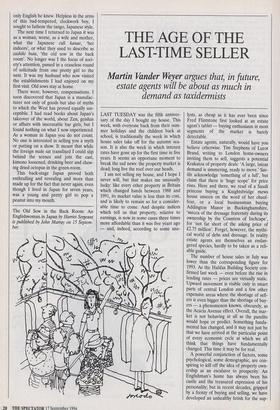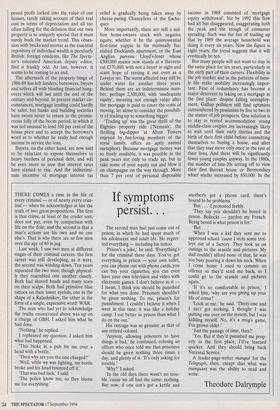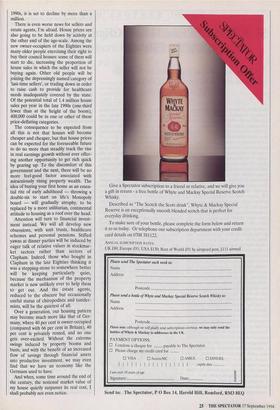THE AGE OF THE LAST-TIME SELLER
estate agents will be about as much in demand as taxidermists
LAST TUESDAY was the fifth anniver- sary of the day I bought my house. This week, with everyone back from their sum- mer holidays and the children back at school, is traditionally the week in which house sales take off for the autumn sea- son. It is also the week in which interest rates have gone up for the first time in five years. It seems an opportune moment to break the sad news: the property market is dead; long live the roof over our heads.
I am not selling my house, and I hope I never will, but that makes me unusually lucky: like every other property in Britain which changed hands between 1988 and 1991, its market value is less than its cost, and is likely to remain so for a consider- able time to come. And despite indices which tell us that property, relative to earnings, is now in some cases three times more affordable than it was five years ago — and, indeed, according to some ana- lysts, as cheap as it has ever been since Fred Flintstone first looked at an estate agent's tablet — buying enthusiasm in most segments of the market is barely detectable.
Estate agents, naturally, would have you believe otherwise. Tim Stephens of Lurot Brand, writing to London home-owners inviting them to sell, suggests a potential Krakatoa of property deals: 'A large, latent demand is simmering, ready to move.' Sav- ills acknowledge 'something of a lull', but claim that there is 'huge scope' for price rises. Here and there, we read of a Saudi princess buying a Knightsbridge mews house unseen on the word of her chauf- feur, or a local businessman buying Addington Manor in Buckinghamshire, `mecca of the dressage fraternity during its ownership by the Countess of Inchcape', for 'not far short of the asking price of £2.75 million'. Forget, however, the mythi- cal world of debs and dressage. In reality estate agents are themselves an endan- gered species, hardly to be taken as a reli- able guide.
The number of house sales in July was lower than the corresponding figure for 1993. As the Halifax Building Society con- firmed last week — even before the rise in lending rates — prices are virtually static. Upward movement is visible only in smart parts of central London and a few other expensive areas where the shortage of sell- ers is even bigger than the shortage of buy- ers — a phenomenon known, obscurely, as the Acacia Avenue effect. Overall, the mar- ket is not behaving at all as the pundits would hope or predict. Something funda- mental has changed, and it may not just be that we have arrived at the particular point of every economic cycle at which we all think that things have fundamentally changed. This time it may be for real.
A powerful conjunction of factors, some psychological, some demographic, are con- spiring to kill off the idea of property own- ership as an escalator to prosperity. An Englishman's home has always been his castle and the treasured expression of his personality; but in recent decades, gripped by a frenzy of buying and selling, we have developed an unhealthy fetish for the sup- posed profit locked into the value of our houses, rarely taking account of their real cost in terms of depreciation and all too often falling for the delusion that our own property is so uniquely special that it must surely buck the market trend. This obses- sion with bricks and mortar as the essential repository of individual wealth is peculiarly British: foreign residents, like The Specta- tor's esteemed American deputy editor, find it frankly odd. At last, however, it seems to be coming to an end.
The aftermath of the property binge of 1986-89 has left lenders, borrowers, buyers and sellers all with blinding financial hang- overs which will last until the end of the century and beyond. In present market cir- cumstances, mortgage lending could hardly be safer, but banks and building societies have sworn never to return to the promis- cuous folly of the boom period, in which it was not unusual to lend 100 per cent of the house price and to accept the borrower's word as to whether he really had enough income to service the loan.
Buyers, on the other hand, are now said to be reluctant to expose themselves to heavy burdens of personal debt, and will be even more so now that interest rates have started to rise. And the indiscrimi- nate incentive of mortgage interest tax relief is gradually being taken away by cheese-paring Chancellors of the Exche- quer.
More importantly, there are still a mil- lion home-owners stuck with negative equity, whether it be the quintessential first-time yuppie in his minimally fur- nished Docklands apartment, or the East Anglian parvenu Lloyd's-loser whose £500,000 manor now stands at a theoreti- cal £370,000, with not a buyer in sight and scant hope of renting it out even as a Lovejoy set. The worst affected may still be under water for another three years. Behind them are an indeterminate num- ber, perhaps 2,500,000, with 'inadequate equity', meaning not enough value after the mortgage is paid to cover the costs of moving, let alone to consider the possibili- ty of trading up to something bigger.
`Trading up' was .the great thrill of the Eighties property ride (Nemesis', the thrilling big-dipper at Alton Towers enjoyed by fun-loving members of the royal family, offers an aptly named metaphor). Because mortgage money was so freely available, it was possible in the peak years not only to trade up, but to take some of your equity out and blow it on champagne on the way through. More than 7 per cent of personal disposable income in 1988 consisted of 'mortgage equity withdrawal', but by 1992 this flow had all but disappeared, exaggerating both the peak and the trough of consumer spending. Such was the fun of trading up that by 1989 the average household was doing it every six years. Now the figure is eight years; the trend suggests that it will eventually be ten.
But many people will not want to stay in the same place for ten years, particularly in the early part of their careers. Flexibility in the job market and in the patterns of fami- ly life make mobility increasingly impor- tant. Fear of redundancy has become a major deterrent to taking on a mortgage in the first place: despite falling unemploy- ment, Gallup pollsters still find optimists outnumbered by pessimists by five to two in the matter of job prospects. One solution is to stay in rented accommodation: young middle-class couples are increasingly likely to wait until their early thirties and the birth of their first child before committing themselves to buying a house, and after that they may move only once in the rest of their lives. And there will be significantly fewer young couples anyway. In the 1980s, the number of late-20s setting off to view their first Barratt house or Bermondsey wharf studio increased by 850,000. In the 1990s, it is set to decline by more than a million.
There is even worse news for sellers and estate agents, I'm afraid. House prices are also going to be held down by activity at the other end of the age-scale. Among the new owner-occupiers of the Eighties were many older people exercising their right to buy their council houses: some of them will start to die, increasing the proportion of house sales in which the seller will not be buying again. Other old people will be joining the depressingly named category of last-time sellers', or trading down in order to raise cash to provide for healthcare needs inadequately covered by the state. Of the potential total of 1.4 million house sales per year in the late 1990s (one-third fewer than at the height of the boom), 400,000 could be in one or other of these price-deflating categories.
The consequence to be expected from all this is not that houses will become cheaper and cheaper, but that house prices can be expected for the foreseeable future to do no more than steadily track the rise in real earnings growth without ever offer- ing another opportunity to get rich quick by gearing up. To the discomfort of this government and the next, there will be no more feel-good factor associated with miraculously rising property wealth. The idea of buying your first home as an essen- tial rite of early adulthood — throwing a double-six to start on life's Monopoly board — will gradually atrophy, to be replaced by a more utilitarian, continental attitude to housing as a roof over the head.
Attention will turn to financial invest- ment instead. We will all develop new obsessions, with unit trusts, healthcare schemes and personal pensions. Stifled yawns at dinner parties will be induced by eager talk of relative values in stockmar- ket sectors rather than sectors of Clapham. Indeed, those who bought in Clapham in the late Eighties thinking it was a stepping-stone to somewhere better will be keeping particularly quiet, because the mechanism of the property market is now unlikely ever to help them to get out. And the estate agents, reduced to the obscure but occasionally useful status of chiropodists and taxider- mists, will be the quietest of all. Over a generation, our housing pattern may become much more like that of Ger- many, where 40 per cent is owner-occupied (compared with 66 per cent in Britain), 40 per cent is privately rented, and no one gets over-excited. Without the extreme swings induced by property booms and busts, and with the benefit of an increased flow of savings through financial assets into productive investment, we may even find that we have an economy like the Germans used to have.
And when, some time around the end of the century, the notional market value of my house quietly surpasses its real cost, I shall probably not even notice.




























































 Previous page
Previous page